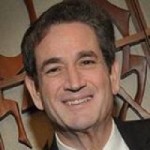By Rabbi Ben Kamin

OCEANSIDE, California — On the gloomy and ominous evening of April 4, 1968, in Indianapolis, Sen. Robert F. Kennedy—against the objections of his advisers and security detail—stood on a flatbed truck and improvised a speech to a crowd of mostly African Americans.
“Bobby” was running for president (and had only eight weeks left to live) but he had an announcement to make to the tense gathering: “I have some very sad news for all of you, and, I think, sad news for all of our fellow citizens, and people who love peace all over the world; and that is that Martin Luther King was shot and was killed tonight in Memphis, Tennessee.”
The crowd roiled in bewilderment, dismay, and grief. But the people listened to the thin young man (he was 42) who gently spoke of the tolerance and humanity that MLK represented. The city of Indianapolis—unlike most American cities—remained peaceful that night.
Near the end of his extraordinary, elegiac statement, Kennedy said, in his nasal Bostonian cadence: “What we need in the United States is not division; what we need in the United States is not hatred; what we need in the United States is not violence and lawlessness, but is love, and wisdom, and compassion toward one another, and a feeling of justice toward those who still suffer within our country, whether they be white or whether they be black.”
Kennedy appealed to the best in those broken men and women that night and it availed him and the community. That was leadership, that was courage, that was dignity, that was America.
At this moment, forty-eight years later, in the aftermath of a shocking election, during which the winning candidate invoked the exact opposite of compassion and wisdom, we are all that crowd of black Americans hearing bad news. But our president-elect did not appeal to our best instincts as human beings and as the descendants of founders who dreamed dreams of a benevolent nation in which we are all born as equals. I don’t think that Mr. Trump actually used the word “love” even once in any of his vaudeville-style campaign appearances before blood-lusting crowds of angry, overwhelmingly white Americans whose wrath he simply parlayed into incitement and votes.
There is pain in this nation, palpable, visceral—at least for the one-half of the nation that retains the notion that our leaders are there to bring out our best. Trump gave us (or those in his realm) permission to hate. To build walls. To despise immigrants without making any distinctions. To mock the weak, the disabled, the economically weakened, and he showed his cosmic contempt for women. Emerging from his limousines and private jets, he just blurted out stuff that was light years away from a flatbed truck in Indianapolis where a real man quoted poetry to hurting people and turned them towards others—not away. He lit the fires of fear and so many of us are, indeed, fearful.
We wanted a president to inspire us, not scare us. We wanted a leader who understands that very few of us are privileged (except for the gift of living in this country) and that most of us are simply trying to squeeze the daylight of our working existences. Instead of hope, we as a nation have elected the tyranny of pain.
Good God, help us.
*
Rabbi Kamin is an author and freelance writer based in Oceanside, California. He may be contacted via ben.kamin@sdjewishworld.com